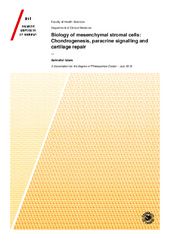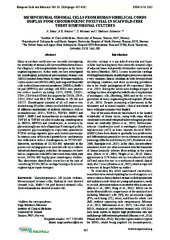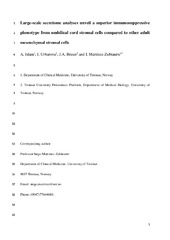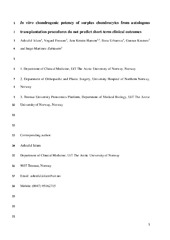| dc.contributor.advisor | Martinez-Zubiaurre, Inigo | |
| dc.contributor.author | Islam, Md Ashraful | |
| dc.date.accessioned | 2018-11-07T16:52:39Z | |
| dc.date.available | 2018-11-07T16:52:39Z | |
| dc.date.issued | 2018-10-12 | |
| dc.description.abstract | The management of articular cartilage lesions is one of the weighty challenges for orthopaedic surgeons. The use of mesenchymal stem/stromal cells (MSCs) has demonstrated as an alternative cell source for cartilage repair due to their multilineage differentiation potential and hypoimmunogenic properties. Despite the advances in cartilage repair techniques, there is no consensus relating to the most suitable cell type for cartilage repair or osteoarthritis treatment. In the paper I, we characterised and compared in vitro chondrogenic capacity of cells harvested from Hoffa’s fat pad (HFPSCs), synovial membrane (SMSCs), umbilical cord (UCSCs) and articular cartilage. We demonstrated poorer in vitro chondrogenesis of MSCs from umbilical cord compared to cells harvested from adult joint tissues. The study of TGF-β receptors revealed low expression of TGF-β receptor type II in umbilical cord stromal cells (UCSCs). This finding may explain the reason for poor chondrogenesis of UCSCs. In the paper II, we investigated the secretomes of HFPSCs, SMSCs, UCSCs and chondrocytes (ACs) to unveil in vitro secretory protein profiles that contribute to paracrine signalling and immunomodulatory characteristics. We found that UCSCs secretes less catabolic factors and less pro-inflammatory factors compared to cells from the adult origin. Considering the anti-inflammatory and pro-anabolic paracrine effects of secreted soluble molecules, UCSCs could be used as an adjuvant therapy for cartilage repair. In the paper III, we investigated if in vitro chondrogenic potential of donor-matched surplus chondrocytes from Autologous Chondrocyte Implantation (ACI)-treated patients could predict clinical outcomes. Counterintuitive, we did not observe any correlation between in vitro chondrogenic capacity of cultured cells and short-term clinical outcomes. Additionally, constitutive expression of previously proposed and novel chondrogenic markers had no value to predict clinical outcomes. Of interest, high-throughput LC-MS/MS protein analysis revealed prolyl 4‑hydroxylase 1, an enzyme involved in collagen biosynthesis, as a novel biomarker linked to superior chondrogenic capacity. | en_US |
| dc.description.doctoraltype | ph.d. | en_US |
| dc.description.popularabstract | Articular cartilage lesions lead to swelling of the synovial joint, debilitating pain, functional impairment, and eventually osteoarthritis. The use of mesenchymal stem/stromal cells (MSCs) has demonstrated as an attractive cell source for cartilage repair due to their multilineage differentiation potential and hypoimmunogenic properties. Despite the advances in cartilage repair techniques, there is no consensus relating to the most suitable cell type for cartilage repair or osteoarthritis treatment. The overall aim of this thesis was to investigate and compare the chondrogenic capacity, and paracrine signalling potential of human MSCs harvested from adult knee joint and young umbilical cord to find a suitable source for cartilage repair. Additionally, we also used several approaches to gather new knowledge about cell-based biomarkers to predict clinical outcomes after cell transplantation procedures. | en_US |
| dc.description.sponsorship | UiT The Arctic University of Norway | en_US |
| dc.identifier.uri | https://hdl.handle.net/10037/14118 | |
| dc.language.iso | eng | en_US |
| dc.publisher | UiT The Arctic University of Norway | en_US |
| dc.publisher | UiT Norges arktiske universitet | en_US |
| dc.relation.haspart | <p>Paper I: Islam, A., Hansen, A. K., Mennan, C. & Martinez-Zubiaurre, I. (2016). Mesenchymal stromal cells from human umbilical cords display poor chondrogenic potential in scaffold-free three dimensional cultures. <i>European Cells and Materials, 31</i>, 407-424. Also available at <a href=http://hdl.handle.net/10037/10544>http://hdl.handle.net/10037/10544. </a><p>
<p>Paper II: Islam, A., Urbarova, I., Bruun, J. A. & Martinez-Zubiaurre, I. (2018). Large-scale secretome analyses unveil a superior immunosuppressive phenotype from umbilical cord stromal cells compared to other adult mesenchymal stromal cells. (Manuscript). <p>
<p>Paper III: Islam, A., Fossum, V., Hansen, A.K., Urbarova, I., Knutsen, G. & Martinez-Zubiaurre, I. (2018). In vitro chondrogenic potency of surplus chondrocytes from autologous transplantation procedures do not predict short-term clinical outcomes. (Manuscript).<p> | en_US |
| dc.rights.accessRights | openAccess | en_US |
| dc.rights.holder | Copyright 2018 The Author(s) | |
| dc.rights.uri | https://creativecommons.org/licenses/by-nc-sa/3.0 | en_US |
| dc.rights | Attribution-NonCommercial-ShareAlike 3.0 Unported (CC BY-NC-SA 3.0) | en_US |
| dc.subject | VDP::Medical disciplines: 700::Basic medical, dental and veterinary science disciplines: 710::Medical molecular biology: 711 | en_US |
| dc.subject | VDP::Medisinske Fag: 700::Basale medisinske, odontologiske og veterinærmedisinske fag: 710::Medisinsk molekylærbiologi: 711 | en_US |
| dc.title | Biology of mesenchymal stromal cells: Chondrogenesis, paracrine signalling and cartilage repair | en_US |
| dc.type | Doctoral thesis | en_US |
| dc.type | Doktorgradsavhandling | en_US |


 English
English norsk
norsk




